Our journey
1992
On Sunday, September 27, the first Settimana Musicale al Teatro Olmpico debuts, opening the season of the Amici della Musica di Vicenza. For the first time in the city, rehearsals open to the public and conferences were closely integrated with the musical programs. A group of musicians—the Trio Italiano, fresh from winning the prestigious Gui Prize, “self-manages” the festival, inviting artists such as Wolfram Christ, Bruno Giuranna, Giovanni Guglielmo, Rocco Filippini, Anthony Pay, Angelo Persichilli, and Franco Petracchi to perform. Lorenzo Arruga, Giorgio Pestelli, and Quirino Principe will be guests at the conferences.
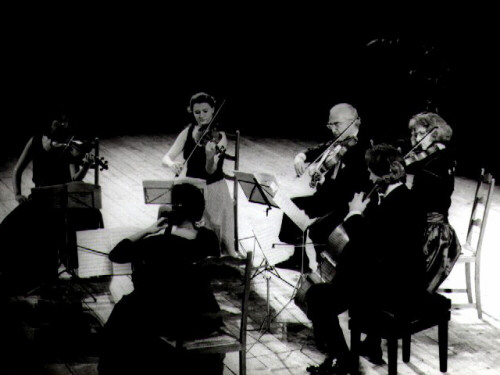
CaikovskijSouvenir de Florence
1993
First themed edition of the festival: Chamber music by Mozart, Brahms, and Ravel. The Trio Italiano, composed of Giovanni Battista Rigon, Sonig Tchakerian, and Teodora Campagnaro, began to gather around them musician friends of their own generation, including Mario Brunello and Andrea Lucchesini, who would henceforth be regular guests at the festival.
1994
With the inclusion in the programs of music by lesser-known composers—such as Archduke Rudolf, Clara Schumann, and Albert Dietrich—another important feature of the festival begins to take shape. Thematic programs, each with a specific title, began to appear. Massimo Quarta and François Joël Thiollier appeared among the artists for the first time, while De Incontrera, Pulcini, and Rattalino appeared in the conferences.
1995
A festival entirely dedicated to Paris and French music. The opening performance was Saint-Saëns' Carnival of the Animals with Bruno Canino and Giovanni Battista Rigon. Domenico Nordio and Danilo Rossi also joined the group of the “musicisti amici” and have returned almost every year since then. The closing performance of this edition was the complete Debussy Sonatas, with the Ravel Quartet.
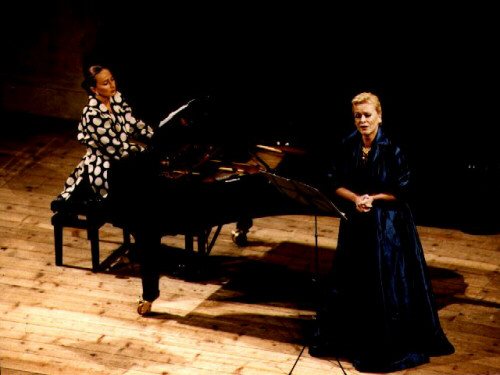
Schumann
Frauenliebe und Leben
Lucia Valentini Terrani,
Marina D'Ambroso
1996
The festival broke away from the Amici della Musica and took on its own autonomous management, with the creation of the cultural association of the same name. It was the only event in Italy to celebrate the centenary of Clara Schumann, with an original program dedicated to women's music. The festival opened with a lieder recital by Lucia Valentini Terrani, in what will unfortunately prove to be one of her last concerts. The collaboration with RAI Radiotre begins, broadcasting all the festival's concerts in their entirety. The first CD produced directly by the festival was also released, featuring music by Mozart and Beethoven recorded live during previous editions' concerts.
1997
Edition of the great centenaries of Schubert and Brahms. Giovanni Sollima begins his three-year collaboration as composer in residence at the festival. The opening concert features the musicians of the Trio Italiano (Silvia Chiesa has since replaced Teodora Campagnaro) with Bruno Canino, Rocco Filippini, Domenico Nordio and Danilo Rossi. A concert dedicated entirely to Jean Pierre Rampal, who falls ill and is replaced by Andràs Adorjan. The collaboration with Radiotre continues, and a new collaboration begins with the Auditorium channel of Filodiffusione.
1998
Grand opening with Raina Kabaivanska and the Trio Italiano in an all-Shostakovich program (the festival was dedicated to “when the Wall was there,” Russian and American music). Two premieres were commissioned (Giovanni Sollima and Nicola Campogrande), and a great deal of 20th-century music was featured, including some rarely heard works. Michel Dalberto was a guest of the festival for two evenings, including an extraordinary concert. The festival closed with Sonig Tchakerian performing Prokofiev's complete sonatas for violin and piano together with Giovanni Battista Rigon.
1999
The last year of the millennium was a year of reflection on “three centuries in comparison,” but also the year that saw the presence of Frank Peter Zimmerman—a memorable opening with Mario Brunello—and Shlomo Mintz, protagonist of two concerts with the musicians of the Trio Italiano.
2000
The year of Bach celebrations, a project paying homage to Bach that received unanimous acclaim. Each evening opened with one of the Brandenburg Concertos, followed by music by other composers inspired by Bach's art. It was a great success for the festival: Amadeus magazine dedicated a special issue to the Brandenburg Concertos at the Olimpico, publishing the recording on two CDs. Meanwhile, the festival was brought forward to June (until then it had been held in October), extended its duration and took on its definitive name of Settimane Musicali.
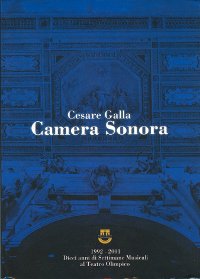
Camera sonora
1992 - 2001
Dieci anni di Settimane Musicali
al Teatro Olimpico
Ed. Accademia Olimpica, Vicenza
2001
This year, the festival also celebrated itself, in particular with a memorable concert in which Daniele Gatti conducted 23 soloists – protagonists of previous editions of the Settimane – with Tchaikovsky's Serenade and Richard Strauss' Metamorphosen, which were then also released on CD. After a taste with Kreutzer the previous year, the three-year cycle of Beethoven's sonatas for violin and piano begins with Sonig Tchakerian and Andrea Lucchesini. Alicia De Larrocha was the star of the festival's Spanish evening, dedicated this year to ‘Music of Euroland’. The lineup of speakers was particularly impressive: Petazzi, Suozzo (who will become a loyal friend of the festival), Villatico, Courir, while Cappelletto and Gasponi celebrated, at the opening, Piero Farulli, awarded by the Accademia Olimpica. The Trio Italiano on Amadeus, with a CD dedicated to the Schumanns.
2002
The year the Trio Italiano retired. The three musicians decided to go their separate ways and bid each other a friendly farewell with an opening concert that was also a farewell, playing the same program as their debut. However, the festival was not affected, continuing with the contribution of the three “individuals.” In this edition, the festival also commences to take an interest in the new generation of artists: after inviting some young pianists from the Imola school in 2001, a concert was offered to the group that had just won the Gui Prize in Florence (the project did not come to fruition only because the prize was not awarded that year). Some young musicians from the Veneto region were also invited to participate in chamber music programs alongside their more established colleagues.
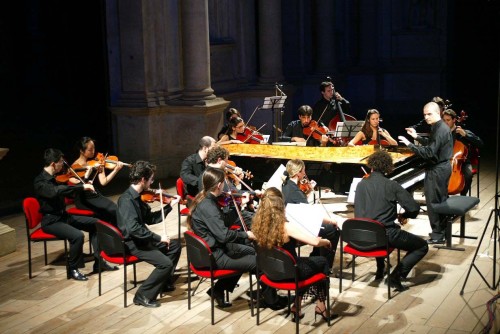
Mozart
Concerto KV 414
Giovanni Battista Rigon,
I Solisti dell'Olimpico
2003
Under the direction of Rigon, I Solisti dell'Olimpico was formed, an orchestral group made up of the best young string players from the Veneto school in recent years. The group became the festival's orchestra in residence, while also pursuing its own external activities during the rest of the year. The program dedicated to Prokofiev and Russia was a great success. It opened with the complete quartets of the great Russian composer and closed with a memorable Peter and the Wolf in chamber formation, without a conductor. The collaboration with Radiotre continues, broadcasting all the concerts of the Weeks in their entirety.
2004
The three-year project Aspettando Amadè kicks off, in anticipation of the Mozart celebrations in 2006, 250 years after the birth of the great Salzburg composer. The first of the three years, entitled Il piccolo grande Mozart (The Little Great Mozart), was dedicated to the musical production of his childhood and youth. The festival opened with a performance of Minuet K 1, composed by Mozart at the age of seven, by a young pianist, also seven years old. After an absence of almost fifteen years, opera returned to the Olimpico with a performance of Bastiano e Bastiana, composed by Mozart at the age of 12. I Solisti dell'Olimpico, which in the meantime has established itself as one of the most interesting chamber orchestras in Italy (in January 2004, under the baton of Rigon, it had the honor of inaugurating the prestigious series of I Concerti al Palazzo del Quirinale live on radio), also hold two symphonic concerts as part of the festival, performing symphonies K 183 and 201. The collaboration with some of the most prestigious Italian artists (Mario Brunello, Domenico Nordio, Laura Polverelli, Sonig Tchakerian...) continues. Once again, RAI Radiotre recorded all the concerts of the Settimane Musicali for broadcast the following autumn.
2005
The Aspettando Amadé project continued, and the festival's commitment to opera continued after the previous year's success. Two titles were programmed, or rather a single title in two almost identical versions. Two titles were planned, or rather a single title in two almost contemporary versions: Mozart's famous Don Giovanni in its first version, that of Prague in 1787, together with its direct predecessor, Don Giovanni set to music by Gazzaniga from Verona, whose libretto Da Ponte was heavily inspired by. The highlight of the festival was the tradition of chamber concerts featuring the best Italian artists. The traditional conferences also endured, and three films about Don Giovanni and Mozart have be screened.
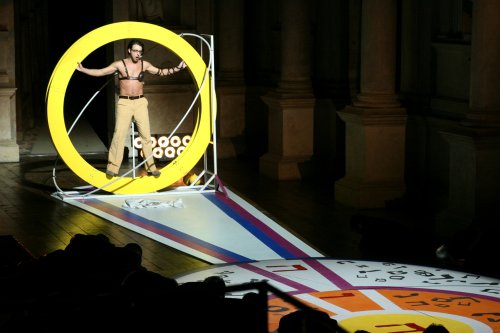
Mozart
Il Flauto Magico
2006
For the final year of the Mozart cycle, Settimane Musicali stages the first modern-day performance of The Magic Flute, translated in 1794 by Giovanni De Gamerra for the Prague Court Theater. This first historical version in Italian of Mozart's masterpiece—recovered from Prague manuscripts in collaboration with the University of Padua—transformed the original Singspiel into a true Italian opera, complete with recitatives. This production aroused considerable interest among national critics. The director was Marco Gandini, the conductor Giovanni Battista Rigon: a few months later, this same artistic partnership would also inaugurate the Festival della Valle D'Itria in Martina Franca, this time with an opera by Paisiello. The cast of young Italian singers was chosen by Gandini and Rigon during a series of auditions at the main Italian singing academies. The opera will be recorded and released on two CDs by a German label. The prestigious chamber concerts (with the new entry of cellist Enrico Dindo), conferences, film screenings, and collaboration with Radiotre continue as usual.
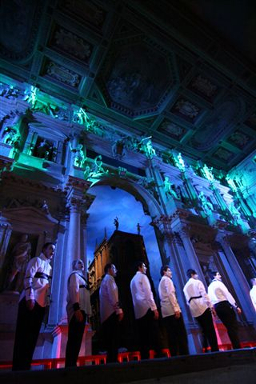
L'italiana in Algeri
2007
First year of the new three-year project Viaggio in Italia (Journey through Italy). Accompanying the Settimane Musicali through the three “stages” of Venice, Rome, and Naples was no longer Mozart, but Gioachino Rossini, the Italian Mozart. The inauguration therefore took place with L'italiana in Algeri, an opera composed for the San Moisè in Venice but presented here in the version adapted by Rossini specifically for the Eretenio in Vicenza in August 1813. Musicological curiosity attracted the most qualified national critics to Vicenza, who showed their appreciation for Damiano Michieletto's minimalist direction and Giovanni Battista Rigon's lively conducting. In terms of chamber music, the opening – for the first time in collaboration with the Festival Biblico – with Messiaen's Quatuor pour la fin du temps and the closing with a tribute to Luigi Ferro's Venetian violin school through two generations of his students (Toso/Angeleri – Guglielmo/Tchakerian) were significant. Finally, a world premiere of a piece by Michele Dall'Ongaro.
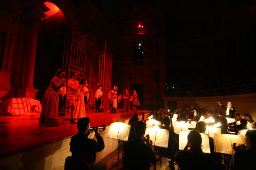
Il Barbiere di Siviglia
2008
With the reconstruction of the first Vicenza performance (Teatro Eretenio, 1825) of The Barber of Seville, the Settimane Musicali continues its Rossini program: this version attracted the interest of Alberto Zedda and the publisher Ricordi, who took it into account in the new critical edition of the opera, and it is also recorded on DVD. For the first time, a second opera was staged at the Settimane: Ottone in villa, with which Vivaldi made his debut as an opera composer – in Vicenza itself! – in 1713. Other notable new features included the inclusion in the festival of the Bach Project directed by Michael Radulescu and the establishment of the Amici dell'Olimpico Association, created with the aim of keeping interest in the festival alive throughout the year. The focus on the younger generation took the form of the launch of a Youth Project, which included the addition of two concerts reserved for young Italian performers to the Festival. Great Italian performers continue to appear alongside Sonig Tchakerian: Bruno Canino, for the concert in collaboration with the Festival Biblico; Enrico Dindo, both as a chamber musician and conducting his Solisti di Pavia; and Mario Brunello for the premiere of a piece commissioned from Luca Mosca, among others.
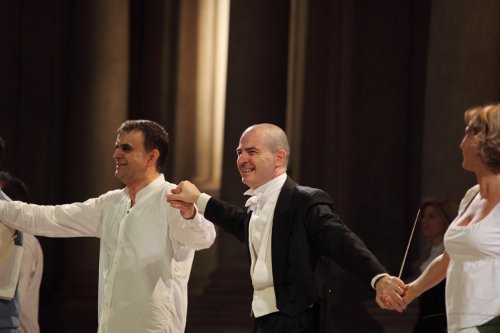
Rossini
Il Turco in Italia
Lorenzo Regazzo,
Giovanni Battista Rigon,
Silvia Dalla Benetta
2009
In February, a grand preview concert featuring the great Martha Argerich, who returned to Vicenza after a thirty-year absence. To crown the three-year project Viaggio in Italia, the stage dedicated to Naples featured a third Rossini opera: Il Turco in Italia, set “in the vicinity of Naples.” The Settimane Musicali presented the opera in a version staged in Naples in 1820, which includd “spoken” recitatives and the comic part of Don Geronio in Neapolitan dialect. Alongside Rossini's Il Turco, there will be a modern premiere of Finto Turco by the Neapolitan composer Piccinni, which will also be broadcast live on RAI Radio Tre. The chamber music concerts feature the usual great performers: Brunello, Lucchesini, Paris, Prosseda and, for the first time in Vicenza, the great English cellist Steven Isserlis. The concerts were further enriched by the participation of three prestigious orchestras: the Orchestra D'Archi Italiana - which opened the Festival with Sonig Tchakerian - the Orchestra de I Pomeriggi Musicali di Milano, and the Hong Kong Sinfonietta. The Bach Project with Radulescu and the Youth Project continue, while the Raccontare la Musica (Telling Music) initiative was inaugurated, an evening dedicated to Gesualdo da Venosa, with Sandro Cappelletto as narrator.
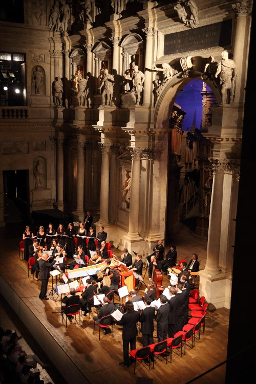
Gaetano Donizzeti,Don Pasquale,Lorenzo Ragazzo
2010
Opening of the new three-year cycle Ambasciatori di note: Italian musicians in European capitals, with the first stop dedicated to Paris. A grand opening night with Martha Argerich's return to the Teatro Olimpico – in a chamber music program with Tchakerian, Chen, Bronzi, and Shek, later repeated at the Bologna Festival and the Accademia Filarmonica Romana. All the chamber music concert programs (one of which was dedicated to Lamberto Brunelli, a great supporter and member of the Association who passed away a few months before the festival) were designed with the French capital in mind, and Sonig Tchakerian was joined by Mario Brunello, Andrea Lucchesini, Fabrizio Meloni, and Bruno Canino. For the opera section, Gaetano Donizetti's Don Pasquale was staged, originally composed for the Teatro Italiano in Paris, but which the Settimane Musicali presented in an unusual version for mezzo-soprano, a tribute to the famous Pauline Viardot Garcia, sister of Maria Malibran, who sang the opera adapting it to her voice. The Youth Project continues and expands (three concerts at Palazzo Leoni Montanari with the complete sonatas for cello and piano and piano trios by Camille Saint-Saëns), the Bach Project, with the traditional participation of Michael Radulescu, and the Progetto Raccontare la Musica (Telling Music Project): an event with Enzo Restagno and his new book on Ravel and a meeting on Pauline Viardot and her musical salon.
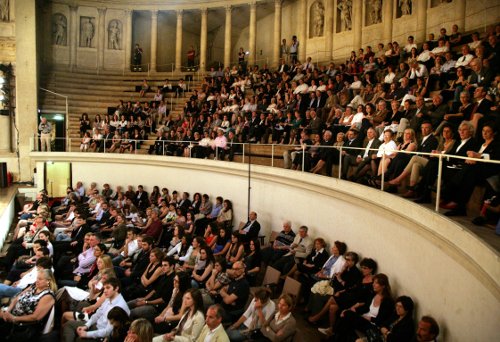
Teatro Olimpico
2011
While the traditional summer festival continued with its highlight program—with the second European stop in Prague—the Settimane Musicali launches two new initiatives: Raccontare la musica (Talking about music) – four meetings with leading figures from Italian cultural life hosted in the foyer of the Teatro Comunale to talk about music and listen to it live – and the Lamberto Brunelli Prize, in memory of Lamberto Brunelli – a member and supporter of the Settimane Musicali at the Teatro Olimpico who died prematurely in 2010 – and dedicated to young pianists. The 20th edition of the festival began between May and June: Mozart's Don Giovanni in the Prague version was a great success, according to Corriere della Sera ‘one of the most beautiful Don Giovannis of recent years’. But also for the concerts with Brunello, Kim, Lucchesini, Tchakerian, the La Fenice String Quartet, the Interpreti Veneziani, and Il Teatro Armonico with Radulescu. Guests of the conference cycle included Bietti, Cammarano, Minardi, and Rattalino.
In 2011, the Settimane Musicali al Teatro Olimpico won the prestigious Abbiati Prize.
Schumann
Il ratto dal serraglio
2012
The trilogy Ambasciatori di note (Ambassadors of Notes), which began in 2010, concluded with the Vienna stage. The 21st edition of the Settimane Musicali al Teatro Olimpico (Olympic Theater Music Weeks) presented a world premiere: Mozart's Il Ratto dal Serraglio (The Abduction from the Seraglio) in the Italian version adapted by Peter Lichtenthal in 1838 for La Scala and never performed before.
In the concert section, the three-year initiative Raccontare Bach (Telling Bach), conceived by Sonig Tchakerian together with Mario Brunello, was inaugurated: starting this year, over the course of three editions of the Festival, the two musicians performed Bach's twelve solos for violin and cello.
The Progetto Giovani (Youth Project) continues with evenings organized at Palazzo Leoni Montanari, featuring the winners of the Premio Venezia, the Settimane Musicali scholarship at the Accademia Nazionale di Santa Cecilia, and the Concorso Lamberto Brunelli.
Not only great performers but also instruments of great historical value: the Stradivarius of the Stauffer Foundation played by Luca Fiorentini, the Pedalpiano by Roberto Prosseda, and the Clavirogano by Claudio Brizi. Over eight thousand people, including the public and critics, attended the seventeen events on the calendar. A success for the 21st edition of the Festival, which was awarded the Abbiati Prize by the National Association of Music Critics.
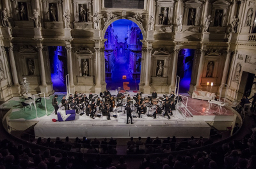
Schumann
Le Nozze di Figaro
2013
After three consecutive three-year artistic projects, the Settimane Musicali returned with an annual program entirely dedicated to Mozart and Spain. Set in Seville, Mozart's Le Nozze di Figaro was staged at the Olimpico in the 1814 Neapolitan version, never before performed in modern times. The 22nd edition of the festival confirms the success of its established events (Concerts, Conversations, Meetings with the Composer, and Youth Project), but also offered its audience new ideas: just think of the theme of the encounter between classical music and jazz in Mozart and Madness and that of reproduced music in The Art of Good Reproduction. Raccontare Bach (Telling Bach) returned, a three-year initiative conceived by Sonig Tchakerian together with Mario Brunello, while Giovanni Sollima brought Tenebrae, il Principe dei musici (Tenebrae, the Prince of musicians) to Vicenza, a tribute to the prince of madrigals four hundred years after his death.
Once again, this year, the closing theme of the festival is Vivaldi's famous The Four Seasons, presented together with The Half Seasons, composed and performed by jazz saxophonist Pietro Tonolo.
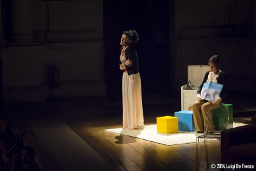
Schumann
Mozart, Così Fan Tutte
2014
The 2014 edition of Settimane Musicali opened with the extraordinary presence of Oscar winner Luis Bacalov, who was not only the transcriber of Piazzolla's famous “Seasons” but also the person introducing the opening concert. It also marks the start of an ambitious three-year project, the Mozart/Da Ponte “trilogy,” directed by Lorenzo Regazzo and conducted by Giovanni Battista Rigon, with the opera Così fan tutte. The novelty and intellectual and artistic significance of this project was immediately recognized by the most qualified critics. Meanwhile, all the other musical projects continue - Bach recounted by Sonig Tchakerian and Mario Brunello, the “Progetto Giovani” with the Venezia, Brunelli, and Santa Cecilia awards... The festival confirmed its concrete and incisive presence in national and international musical programming.
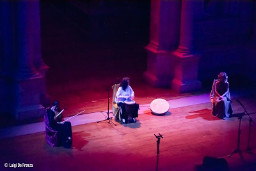
Dante e Bach
2015
In 2015, Settimane Musicali has focused on international tourism and offered two “Mozart/Rossini Weekends” at the Teatro Olimpico, with two operas: Don Giovanni - the second stage of the project entrusted to Lorenzo Regazzo and Giovanni Battista Rigon - and Rossini's Signor Bruschino, produced in collaboration with the Teatro La Fenice in Venice and directed by Bepi Morassi.
The “Mozart/Rossini Weekends” allow tourists staying in Vicenza for one night to attend two different performances in the wonderful Palladian setting of the Olimpico.
With the “Raccontare Bach” project now complete, Sonig Tchakerian was launching into Bach - and Vivaldi - “recomposed,” involving musicians of the caliber of Giovanni Sollima, Pietro Tonolo, and Paolo Birro, artists such as actress Sonia Begamasco, and director Lorenzo Arruga.
A great success, thanks to the large foreign audience and the appreciation of national and international critics, smiles on this festival, which concluded with a tribute to Armenia and Armenian music in the presence of the Armenian ambassador to Italy.
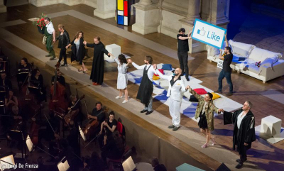
Le Nozze di Figaro
2016
The 2016 edition marked the conclusion of the important Mozart trilogy project - Così fan tutte, Don Giovanni, Le nozze di Figaro - conducted by Giovanni Battista Rigon and directed by Lorenzo Regazzo. The project has attracted the attention and appreciation of national and international critics, once again placing Vicenza and the Teatro Olimpico at the center of the Italian music world. The valuable presence of chamber concerts also continues, with a significant “prologue,” MuVi (Musica-Vicenza), a day in which the entire city, at various times of the day, was filled with musicians and groups linked to the festival: a true celebration of music!
2017
Having successfully completed the Mozart trilogy, the SMTO was now embarking on a new musical journey—this time focusing on Rossini—with the intention of staging, over a period of five years until 2021, the “Venetian” farces that marked the debut of the 18-year-old genius from Pesaro. Directed by Marco Gandini and conducted (from the harpsichord, as Rossini himself did at the Teatro Eretenio when he presented his “Italiana in Algeri” in 1813) by Giovanni Battista Rigon, a young and talented singing company brought to life “La Cambiale di matrimonio,” the first opera ever written by the Pesaro composer.
The usual opera/concert weekends attracted many tourists to Vicenza, who on alternate days were also able enjoy refined performances by violinist Sonig Tchakerian and the Orchestra di Padova e del Veneto (complete Mozart concertos, first evening), cellist Mario Brunello, Tchakerian again and pianist Lucchesini, in a sophisticated French program (Debussy, Chausson) together with the Nous Quartet.
The festive opening with Mu-Vi, the Brunelli piano competition, the mini-series of the Progetto Giovani, and conversations with eminent musicologists and music critics completed the offering of a festival that confirmed its status as a cultural reference point of the highest order, the pride of the city of Vicenza and its Teatro Olimpico, the oldest and most beautiful theater in the world..
2018
The 2018 edition featured L'inganno felice, Rossini's first real success. The Vicenza performance, conducted from the harpsichord by maestro Giovanni Battista Rigon and directed by Alberto Triola, was a huge hit with audiences and critics alike.
The section dedicated to chamber music, curated by Sonig Tchakerian, had a joyful preview with Mu.Vi., a Sunday when the historic center of Vicenza resounded in courtyards, halls, museums, and squares along the Corso Palladio promenade in Vicenza with more than 30 artists present, many of them young talents. Everyone shared the music in close contact with the audience.
The returns and new collaborations between the artists on stage at the Olimpico for the chamber music project were very welcome. The great violinist Shlomo Mintz returned to the Festival after many years, on stage with Sonig Tchakerian, Alfredo Zamarra, and Silvia Chiesa, in a captivating program with music by Kodaly, Martinu, and Mozart. Sonig Tchakerian continued her journey around her origins. For the first time at the Festival, Paolo Kessisoglu, an extraordinary actor of Armenian origin, gave voice to Varujian's evocative poetry and the ironic and profound vision of the Armenians in Saroyan's stories with Stefania Redaelli and Sonig Tchakerian and music by Komitas, Babadjianian, and Khachaturian. The stars of the third and final evening were violinist Sonig Tchakerian and the Orchestra di Padova e del Veneto, performing Concerto KV 207 in B-flat major, Adagio KV 261 in E major, and Concerto KV 219 in A major. The concert cadenzas, written for Sonig by the extraordinary cellist/composer Giovanni Sollima, gave life to a unique project, in which tradition and innovation coexisted in extraordinary harmony.
As usual, a lot of space was dedicated to young people: the Gallerie d'Italia hosted the Progetto Giovani (Youth Project) again this year, three concerts by young musicians who won the Venice Prize, a scholarship at the Accademia Nazionale di Santa Cecilia, and the winner of the Brunelli Prize, which the Settimane Musicali has been organizing since 2011 in memory of Lamberto Brunelli.
2019
In cammino
This edition saw a change in artistic direction following the resignation of Giovanni Battista Rigon. Artistic direction was entrusted to Sonig Tchakerian, a violinist who has won numerous international awards, head of the violin class in the advanced courses at the Accademia Nazionale di Santa Cecilia in Rome, recently awarded at the Cremona Musica Awards, and, since 2013, responsible for the artistic project of chamber music for the Settimane Musicali.
Sonig Tchakerian, in agreement with President Federico Pupo and the board of directors, has revived the Festival in its original artistic form dedicated to chamber music.
On the road, with the pleasure of moving forward, with the hope of finding, with the pride of searching, as has been the case since the Festival was born, on a journey that embraces the initial idea of a ‘workshop’ where chamber music is ‘created’ and enriched for the occasion of the Settimane Musicali with special projects and extraordinary musicians.
The Festival took place from May 25 to June 16, 2019.
The prologue to the event was the now traditional Mu.Vi Musica.Vicenza, an event in its fourth edition. On Sunday, May 26, Mu. Vi brought great music with concerts, open rehearsals, lessons/concerts, and various events in the most beautiful locations in the historic city center, such as the Odeo del Teatro Olimpico, Palazzo Chiericati, the courtyard of Palazzo Trissino, and the courtyard of Gallerie d’Italia. Forty-two artists were involved, including many young talents, in a day of true celebration of music.
On May 25, in collaboration with the Arrigo Pedrollo Conservatory, the Brunelli Prize, a national piano competition established in 2011 and now in its ninth edition, took place. The prize has become an important event for extraordinary pianists who come in increasing numbers from all over Italy. The winner was Elia Cecino.
The Progetto Giovani, which took place in the Odeo del Teatro Olimpico, is the result of initiatives and collaborations proposed by Settimane Musicali. There were three traditional events with concerts by Stefano Andreatta, winner of the Settimane Musicali scholarship at the Accademia Nazionale di Santa Cecilia, Gabriele Strata, winner of the Venice Prize, and Elia Cecino, winner of the Brunelli Prize, organized by Settimane Musicali itself.
The public rehearsal was held for the first time in Palazzo Chiericati: a unique opportunity for music lovers of all ages to follow the study, rehearsals, and exchanges between musicians. Discover the real work that goes into preparing a concert before going on stage.
Six concerts in the Teatro Olimpico, on a journey around the world. Many encounters on this journey.
The opening concert with Le Stagioni nel Mondo - In Cammino da Venezia a Buenos Aires with Sonig Tchakerian and the Orchestra di Padova e del Veneto. The seasons with their scents, colors, and emotions, with that discreet, mysterious, and silent step that precedes and follows us, near and far in the world. At the Settimane Musicali at the Teatro Olimpico, Vivaldi's Four Seasons and Piazzolla's Cuatro Estagiones Portenas, the latter in the version for violin and orchestra written for Sonig by the great Luis Bacalov.
The concert dedicated to Leonardo 500, In cammino da Vinci verso il mondo (From da Vinci to the world), with the extraordinary ensemble laReverdie and Musica per il Bestiario di Leonardo (Music for Leonardo's Bestiary). Dating back to 1494, the Bestiary is divided into short chapters introduced by a title that sometimes refers to the animal in question, sometimes to a virtue or vice that the animal described embodies in terms of temperament and character. Leonardo's text reflects all the vitality of medieval culture. It is precisely from this evidence that the idea arose to combine some of the animals described by Leonardo with 14th-century madrigals or caccia, crowded with a varied and rich catalog of animals that follow the same models that Leonardo seems to have drawn on later.
The evening Effetto Mozart - Amadeus In cammino fra le donne (Walking among women) with the narrating voice of the great Giancarlo Giannini, a special guest at the Festival for the first time. Mozart recounted through his letters and two famous Mozart sonatas for violin and piano with Sonig Tchakerian and Roberto Prosseda.
In the chamber music program, the evening dedicated to Armenia was eagerly awaited by the Festival's passionate audience. And here it is, In Cammino dall'Ararat a Parigi (On the Way from Ararat to Paris), with Mario Brunello and Sonig Tchakerian. A program that starts in Armenia, crossed Turkey, and arrives in Paris; a world of sounds, emotions, a world that was both distant and close, a world that was necessary for everyone.
The final evening of the Festival - Il Sestetto - features an extraordinary repertoire, two famous sextets: Tchaikovsky's ‘Souvenir de Florence’, the composer's tribute to Florence, a destination he frequently visited, and Schoenberg's ‘Verklärte Nach’, the only symphonic poem conceived for chamber music, written on Dehmel's extraordinary poem from the collection ‘Weib und Welt’. Once again, the Festival's long-standing focus on young talent was confirmed. Acclaimed musicians and promising young talents played together for this occasion, in collaboration with Musica con le Ali, the advanced courses of the Accademia Nazionale di Santa Cecilia, and the Accademia Stauffer in Cremona. Sonig Tchakerian together with Alfredo Zamarra, Silvia Chiesa, and the very young Damiano Barreto, Alessandro Acqui, Ludovica Rana, and the voice of Maria Luisa Zaltron for the final evening of the event.
There was plenty of space for musical dissemination with the Conversations: before the evenings in the theater, performers and musicologists discussed the concert program together. This year with Federico Pupo, Lorenzo Arruga, and Giovanni Bietti.
The notes accompanying the program in the Festival book were written by Lorenzo Arruga.
Thanks to the 79 artists involved and the loyal and enthusiastic audience. The press office, Studio PRP, handled the communication and promotion of the Festival with interviews, articles, and radio appearances. Eighty articles were published in national and local newspapers and press releases; appearances on national radio stations such as Rai Radio 3 Suite, Gr Radio Rai 3, Radio 24, and Radio Classic; announcements and interviews on regional TV stations such as TGR Veneto, GR Radio Veneto, and local TV stations such as TVA Vicenza, Telepadova, and Telenuovo.
Thanks to the institutional bodies, main sponsors, sponsors, partners, cultural partners, and media partners who renewed their trust and support for the Settimane Musicali al Teatro Olimpico.
2020
Beethoven Festival
In the year marking the 250th anniversary of Ludwig van Beethoven's birth, following the suspension of the event scheduled for May and June due to the urgent measures implemented by the government throughout Italy to contain and manage the COVID-19 epidemiological emergency, the Settimane Musicali at the Teatro Olimpico in Vicenza, now in its 29th edition, rediscovered the thrill of live music with the Beethoven Festival entirely dedicated to the genius from Bonn.
A special Beethoven edition in three events in Vicenza, in the historic setting of the Teatro Olimpico, Palazzo Chiericati, and the Church of Santa Corona, combining sound and storytelling in the traditional festival format.
At the Teatro Olimpico, the opening concert featured the Sonata for Piano and Violin in A major, Op. 47, known as the Kreutzer Sonata. Dedicated to the French musician and composer Rodolphe Kreutzer, it was “written in a very concertante style, almost like a concerto.” A performance with Sonig Tchakerian on violin, Andrea Lucchesini on piano, and Giovanni Bietti's captivating narration on Beethoven's Kreutzer Sonata and its implications in Tolstoy's short novel.
At Palazzo Chiericati, the second event in the Beethoven & Brunelli B&B Marathon, scheduled from 10:30 a.m. to 7:30 p.m., was divided into six concerts and entirely dedicated to piano sonatas. True to the spirit of cultural experimentation and attention to young talent, the marathon was the ideal opportunity to celebrate the 250th anniversary of Ludwig van Beethoven's birth and the young winners of the Lamberto Brunelli Prize - National Piano Competition. The piano sonatas provided company throughout the day thanks to the stories of musicologist Cesare Galla and the performances of five winners of previous editions of the award: Stefano Andreatta, Brunelli Award 2011, Claudio Bonfiglio, Brunelli Award 2012, Luca Chiandotto, Brunelli Award 2018, Marco Rizzello, Brunelli Award 2017, and Elia Cecino, winner of the 2019 Brunelli Prize.
Finally, the last event of the 29th edition of the Festival took place in the Church of Santa Corona. The program featured the famous Ninth Symphony in Franz Liszt's transcendental and visionary 1864 transcription for soloists, choir, and piano. Exceptional musicians took to the stage for this very special version of the great symphony: Maurizio Baglini on piano, Annamaria Dell'Oste on soprano, Laura Polverelli on mezzo-soprano, Giuseppe Varano on tenor, Daniele Caputo on baritone, and the Friuli Venezia Giulia Choir conducted by Cristiano Dell'Oste. The notes to the program in the Festival book were written by Oreste Bossini.
The Settimane Musicali al Teatro Olimpico Festival, which had always been sensitive to the involvement and promotion of young people, also participated in the Veneto Region's program for the enrichment of educational offerings with the creation of the Ricreazioni Musicali project. The project developed through open rehearsals, conversations/lessons, the Progetto Giovani (Youth Project), meetings between high school students and young musicians, concerts by young talents as part of Mu.Vi, collaborations in chamber music programming, organization, and social media communication with audio/video interviews with the winners of the Brunelli Prize during the Marathon. The production, post-production, and editing of introductory posts published on the official channels and on the Festival’s website were also supervised by a communications planning expert.
2021
Hausmusik
Finally, the Settimane Musicali at the Teatro Olimpico were back! With an extraordinary project—Hausmusik—conceived in the traditional formula of chamber music, experienced as in a ‘workshop’ where extraordinary artists and promising young talents gathered exclusively for the festival. An important edition that also celebrated 30 years together with the artists, the public, public institutions and private sponsors, and friends who believed in us and worked with us behind the scenes.
The 2021 festival opened, as is tradition, with Mu.Vi. Musica.Vicenza, an event eagerly awaited in the city and now in its fifth edition. The day, Sunday, May 30, involved many promising young musicians and took place along the Corso Palladio promenade between the courtyard of Palazzo Trissino, the Colonnade of Palazzo Chiericati, the Odeo of the Teatro Olimpico, the courtyard of Gallerie d’Italia and the Temple of Santa Corona.
At the Teatro Olimpico, cellist Mario Brunello's recital inaugurated the 30th anniversary with a concert of sound and storytelling in the anti-rust formula he devised. Also, at the Teatro Olimpico, the second concert featured an exceptional ensemble brought together for the occasion by Sonig Tchakerian to perform the most beautiful and engaging chamber music by Johannes Brahms. Joining her on stage were Domenico Nordio, Danilo Rossi, Enrico Bronzi, and the very young Luca Giovannini and Francesco Morello. With a preview for students, we celebrated together with engineer Paolo Fazioli, the famous Italian piano manufacturer. 40 Fazioli anniversary - from dream to sound - brought together on stage, alongside its founder, pianists Maurizio Baglini, Roberto Prosseda, Gabriele Strata, and Axel Trolese. Finally, at the Teatro Olimpico with the Orchestra di Padova e del Veneto, Sonig Tchakerian, and Andrea Lucchesini. The program also included Chopin's Concerto No. 1 - in a Hausmusik version - for piano and strings. A tribute to Dante Alighieri could not be missing from the celebrations for the 700th anniversary of his death: Vox in Bestia - A Handbook of Divine Animals - a project in which Guido Barbieri recounted the soundscape in Dante's Comedy with the participation of soprano Laura Catrani. Hausmusik returned to Palazzo Chiericati for two concerts featuring Brahms' two quartets op.51, in the composer's original transcription for four-hand piano with Stefania Redaelli and Gabriele Dal Santo, and original transcriptions for four-hand piano of compositions by Rossini, Beethoven, and Ravel with Marco Sollini and Salvatore Barbatano.
The calendar of the XXX Settimane Musicali al Teatro Olimpico has been enriched with initiatives in which young people, whether spectators or performers, had been the protagonists: this was the project to enrich the school curriculum, launched with the Veneto Region, to offer students the opportunity to attend meetings and concerts and to discuss topics related to music and musicians; and the Progetto Giovani (Youth Project), which hosts talented young musicians who won awards and were at the beginning of their concert careers. Valentina Kaufmam, Chiami Matsushima, Giulia Rimonda, and Teresa Storer. Finally, in September, the 10th Lamberto Brunelli Prize - National Piano Competition - was held for the best graduates of Italian conservatories. The winner was Kostandin Tashko. 'Una musica costante' were the notes written by Guido Barbieri for the program. The national and international press and television had continuously followed the concerts we had organized.
2022
First the silence, then sound, or words.
The mystery of silence, of waiting, when revealed in sound and words, in a space unique in the world such as the Olympic Theater in Vicenza, become the hallmark of the festival's program for the three-year period 2022-2024.
As always, the festival was anticipated by Mu.Vi: a Sunday dedicated to music among the people in the Colonnade of Palazzo Chiericati, in the Odeo of the Teatro Olimpico, in the Loggia del Capitaniato, and in the courtyard of Gallerie d’Italia. Thanks to all the emerging artists who played and talked about chamber music, jazz, dance, accordions, and baroque, for an ever-closer contact with the citizens and the passionate audience of the festival. A special space in the 2022 edition was dedicated to amateur instrumentalists, in collaboration with MiAmOr, and in particular to the repertoire for piano and orchestra in a version for two pianos, in the traditional search for Hausmusik present in the festival's program since last year's edition.
There was no shortage of premieres, which have always been part of the festival program. The 2022 program included the world premiere of La tua voce nella mia by Delilah Gutman and Monodia by Tigran Mansurian, the latter confirming the Armenian influence on Tchakerian's program.
The Progetto Giovani has hosted concerts by winners of national and international competitions such as the Lamberto Brunelli Prize, the Venice Prize, the Guglielmo Competition, the pianist selected at the Academy of Pinerolo and Turin, and the best instrumentalist selected at the Advanced Training courses of the National Academy of Santa Cecilia. Elia Cecino, Gabriele Melone with Sofia Adinolfi, Davide Ranaldi, and Kostandin Tashko have performed. Centenaries, Bach Cycle, and Hausmusik were some of the research areas of the festival's program for the three-year period 2022-2024.
Profique's artistic collaborations are ongoing with the Arrigo Pedrollo Conservatory in Vicenza, in particular for the national piano competition named after Lamberto Brunelli (a member and supporter of the festival who passed away in 2010), with the Cesare Pollini Conservatory in Padua for the participation of the best students in the Mu.Vi day, with the Amici della Musica in Florence, the Amici della Musica in Padua and Asolo Musica for the inclusion of the winner of the Brunelli Prize in their artistic programming, with the Accademia Nazionale di Santa Cecilia for a concert for the best student of the advanced courses in violin, cello, piano, and baroque singing, and with the Accademia di Musica in Pinerolo and Turin for the best pianist selected from the master classes. There were also projects carried out in collaboration with local schools to create listening guides, concerts dedicated to them, and audio/video interviews with young talents created for social media channels.
Finally, the 11th Lamberto Brunelli Prize, the national piano competition organized by Settimane Musicali at the Teatro Olimpico since 2011, has now grown into an ambitious and innovative project from the 2022 edition onwards. From now on, the competition will consist of two rounds: a preliminary round and a final with orchestra, the latter at the Teatro Olimpico. Joint winners Alessandro Del Gobbo and Wakana Marlene Tanaka. In addition, in 2022, the festival launched its first crowdfunding campaign, the proceeds of which went to support the 11th Lamberto Brunelli Prize in its new guise and to the young people who worked on social media communication and the general organization of the prize.
The 2022 artists: Alessandro Altarocca, Giulia Bolcato, Pietro De Maria, Enrico Dindo, Giuseppe Gibboni, Giovanni Hoffer, Roberto Loreggian, Alberto Maron, Giuliana Musso, Paola Pitagora, Giovanni Sollima, Marco Sollini-Salvatore Barbatano duo, Sonig Tchakerian, Orchestra di Padova e del Veneto. The best of youth – From Bach to Pasolini and back – programme notes by Cesare Galla.